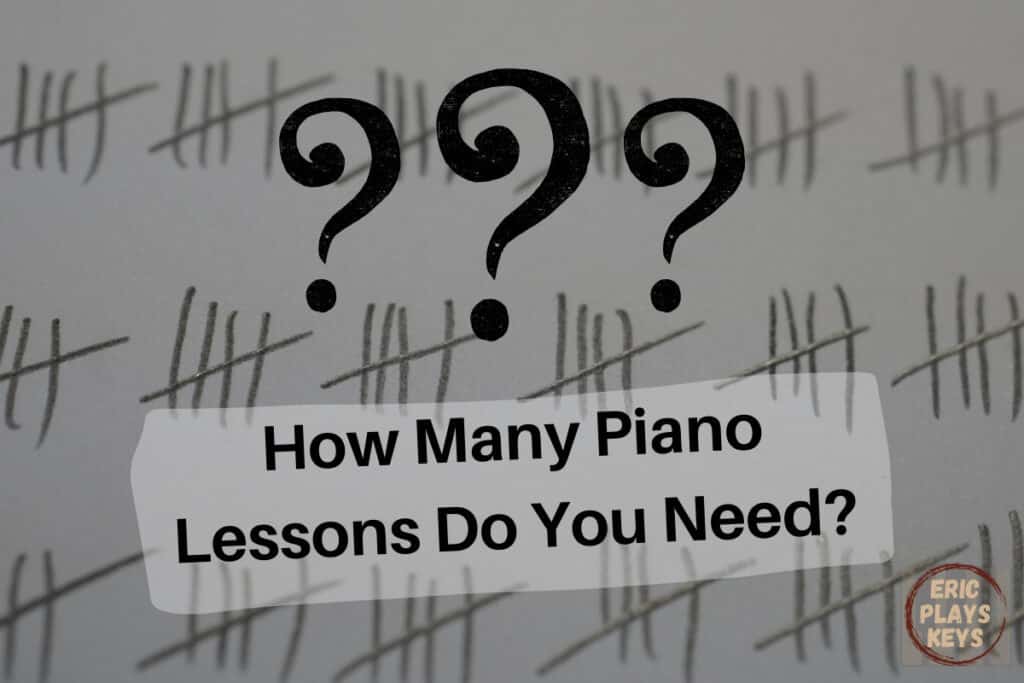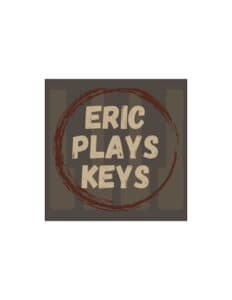
The decision to start taking piano lessons can be tough, especially when considering the cost and time commitment. To best inform your decision, it helps to know how many lessons you’ll need, and at what frequency. Using my years of experience with and without lessons, I’ve put together this guide to help you determine the quantity of piano lessons that’s best for you.
Not a single piano lesson is required to learn how to play piano, although lessons can be very helpful. Occasional lessons as needed help independent learners the most, while recurring weekly lessons are best for beginners and highly motivated students.
Below, I’ll elaborate on why lessons are not required, in what cases they could be beneficial to you, how long you should take lessons, and more!
You Don’t Need Piano Lessons, But You May Want Them
Taking piano lessons is not an absolutely essential requirement – it is possible for everyone to teach themselves to play using online resources, courses, and informational videos. However, this approach requires the student to have an unusually high degree of independence and discipline.
On the other hand, when you take lessons you get access to guidance from someone more experienced than you. They can point you in the right direction, help you avoid mistakes, motivate you, and keep you accountable.
So how do you know which group you fall into? It really depends on your personality and learning style.
Some students are very self-motivated and independent, and it’s best for these people to learn solo. This is because they can grow to resent being directed and told what to practice. Even if the student loves piano, they can negatively associating the instrument with their lessons, and quit.
Others may just not know what to practice or how to get better. It’s possible to figure these things out on your own, but students who fall into this category will definitely want lessons and guidance.
You may find that you fall into both of these categories, depending on the situation. I’d recommend a middle of the road approach here – take lessons when you’re unsure where to go, and learn on your own when you feel like it.
Another reason you may want lessons is because the act of spending money is a motivating factor to keep playing. If you put your money where your mouth is, it’s easier to stick to your goal of improving at piano. However, make sure that you’re not putting unnecessary pressure on yourself to ‘get your money’s worth’ from your lessons – if you stop enjoying them, then stop taking them and don’t view your investment as ‘wasted’.
I took classical piano lessons for 13 years, and have also been self-taught for almost 7 years now. Even while I was taking classical lessons, I was teaching myself jazz piano. I benefitted immensely from my lessons because I had a good teacher who kept me on track, but also excelled by setting my own jazz-related goals.
Now that I’ve been self-taught for many years, I really enjoy it. I know that sometimes a teacher would hold me accountable if I get distracted, which happens occasionally. However, I enjoy the feeling of keeping myself accountable, and answering only to myself.
There are times where I’m unsure what to work on, or how to improve. This happens once or twice a year, and I usually reach out to old teachers and some LA musicians I know for a lesson or two. They set me back on track, and I work on the things they said for months or years.
The moral of my story is that you should look within yourself to figure out how many lessons you ‘need’, and it can change based on how you feel. Craft your own journey to improve your piano skills, and get help when you want or need it.
How Many Years of Piano Lessons Should You Take?
It’s best to take as many years of lessons as possible if you enjoy them. For students who learn independently, there’s no need for any lessons. For students who are just hoping to learn the fundamentals, a couple years of weekly lessons should be sufficient.
There’s no limit to how much benefit you can get from piano lessons. If you’re able to, and you respond well to lessons, then you should take them as long as you can. Even very experienced players sometimes take lessons and get advice from other musicians, because it helps to have additional opinions.
If you’re wondering what the bare minimum number of years of lessons you have to take is, that may be a sign that recurring lessons aren’t a good idea. Try to not to think of lessons as a necessary evil – they aren’t absolutely necessary.
However, if you just want to get a sense of how many years will be helpful to get the basics down, that’s ok. Usually 3-5 years should do the trick – after this time, most students I’ve seen have enough skills to continue learning on their own.
How Do You Know If You Should Take Lessons Or Not?
This one comes down to your personality type and learning style. Look to your other learning habits to decide whether you’re a more independent learner, or learn best with guidance. Keep in mind that these categories are neither good or bad – they’re just different.
When you’re in or were in school, how did you feel about your teachers? Did you talk in class, disagree with them, and skip your homework? Chances are, this will bleed over into piano lessons. Or were you respectful in class, getting good grades and excelling in a structured curriculum? You’ll excel with piano lessons as well.
A lot of people fall into the middle of these two categories – that’s OK, although it makes your decision harder. Fortunately, I wrote an entire article on deciding whether piano lessons are worth it (check it out here).
I personally fell into both categories – it all depended on the teacher. With teachers I connected with, I was respectful and did well. With teachers I didn’t like, I goofed off and resented the entire experience. Luckily, I connected with my piano teacher and got a lot of value from him. If I hadn’t found a good teacher, I likely would have tried to continue the journey self-taught.
Can You Get Good at Piano Without Piano Lessons?
It’s possible to achieve mastery of piano without piano lessons, although it will be exceedingly difficult. This is because piano teachers guide students towards success, and help them avoid unnecessary mistakes. However, it’s entirely possible to guide oneself effectively using online resources.
Furthering your skills on piano will likely be harder without a teacher, but is definitely doable with enough commitment, diligence, and self-awareness.
I’ve spent many years now improving my skills without a teacher, although I gained a foundation for doing so during my years of piano lessons. You’ll have to judge on your own whether you have the ability to keep yourself on track.
As far as content to learn, there’s so many online resources to help you improve. Whether it be Youtube videos, ebooks, online courses, or even this blog – you should be able to find some advice and teachings that resonate with you.
If you’re interested in teaching yourself to play, check out my full guide for self-teaching piano players here.
